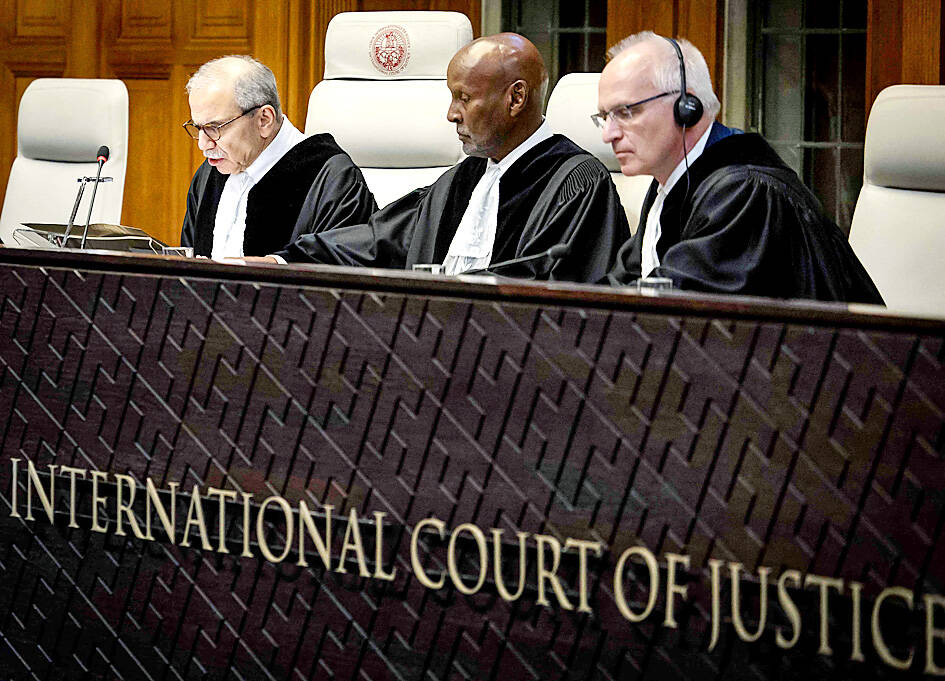Israeli airstrikes and artillery yesterday pounded Rafah, despite the UN’s top court ordering an “immediate halt” to its military offensive in the southern Gazan city.
In a case brought by South Africa alleging the Israeli military operation amounts to “genocide,” the International Court of Justice (ICJ) ordered Israel to halt its Rafah offensive and also called for the “immediate and unconditional release” of the hostages held by Hamas in Gaza.
In its ruling, the ICJ said Israel must “immediately halt its military offensive, and any other action in the Rafah Governorate, which may inflict on the Palestinian group in Gaza conditions of life that could bring about its physical destruction in whole or in part.”

Photo: AFP
The Hague-based ICJ, whose orders are legally binding, but lack direct enforcement mechanisms, instructed Israel to keep open the Rafah crossing between Egypt and Gaza, which Israel closed earlier this month.
It also ordered Israel to allow UN-mandated investigators “unimpeded access” to Gaza to look into the genocide allegations.
Israel gave no indication it was preparing to change course in Rafah, saying the court had got it wrong.
“Israel has not and will not carry out military operations in the Rafah area that create living conditions that could cause the destruction of the Palestinian civilian population, in whole or in part,” Israeli National Security Adviser Tzachi Hanegbi said in a joint statement with Israel’s foreign ministry spokesman.
Hamas, the Iran-backed Islamist group that has ruled Gaza since 2007, welcomed the ICJ ruling on Rafah, but criticized its decision to exclude the rest of the Palestinian territory from the order.
In spite of the ICJ ruling, Israel carried out strikes throughout the Gaza Strip yesterday morning as fighting raged between the army and Hamas’ armed wing.
Palestinian witnesses and Agence France-Presse teams reported Israeli strikes or shelling in Rafah, the central city of Deir al-Balah, Gaza City, Jabalia refugee camp and elsewhere.

CHIP WAR: The new restrictions are expected to cut off China’s access to Taiwan’s technologies, materials and equipment essential to building AI semiconductors Taiwan has blacklisted Huawei Technologies Co (華為) and Semiconductor Manufacturing International Corp (SMIC, 中芯), dealing another major blow to the two companies spearheading China’s efforts to develop cutting-edge artificial intelligence (AI) chip technologies. The Ministry of Economic Affairs’ International Trade Administration has included Huawei, SMIC and several of their subsidiaries in an update of its so-called strategic high-tech commodities entity list, the latest version on its Web site showed on Saturday. It did not publicly announce the change. Other entities on the list include organizations such as the Taliban and al-Qaeda, as well as companies in China, Iran and elsewhere. Local companies need

CRITICISM: It is generally accepted that the Straits Forum is a CCP ‘united front’ platform, and anyone attending should maintain Taiwan’s dignity, the council said The Mainland Affairs Council (MAC) yesterday said it deeply regrets that former president Ma Ying-jeou (馬英九) echoed the Chinese Communist Party’s (CCP) “one China” principle and “united front” tactics by telling the Straits Forum that Taiwanese yearn for both sides of the Taiwan Strait to move toward “peace” and “integration.” The 17th annual Straits Forum yesterday opened in Xiamen, China, and while the Chinese Nationalist Party’s (KMT) local government heads were absent for the first time in 17 years, Ma attended the forum as “former KMT chairperson” and met with Chinese People’s Political Consultative Conference Chairman Wang Huning (王滬寧). Wang

CROSS-STRAIT: The MAC said it barred the Chinese officials from attending an event, because they failed to provide guarantees that Taiwan would be treated with respect The Mainland Affairs Council (MAC) on Friday night defended its decision to bar Chinese officials and tourism representatives from attending a tourism event in Taipei next month, citing the unsafe conditions for Taiwanese in China. The Taipei International Summer Travel Expo, organized by the Taiwan Tourism Exchange Association, is to run from July 18 to 21. China’s Taiwan Affairs Office spokeswoman Zhu Fenglian (朱鳳蓮) on Friday said that representatives from China’s travel industry were excluded from the expo. The Democratic Progressive Party government is obstructing cross-strait tourism exchange in a vain attempt to ignore the mainstream support for peaceful development

ELITE UNIT: President William Lai yesterday praised the National Police Agency’s Special Operations Group after watching it go through assault training and hostage rescue drills The US Navy regularly conducts global war games to develop deterrence strategies against a potential Chinese invasion of Taiwan, aimed at making the nation “a very difficult target to take,” US Acting Chief of Naval Operations James Kilby said on Wednesday. Testifying before the US House of Representatives Armed Services Committee, Kilby said the navy has studied the issue extensively, including routine simulations at the Naval War College. The navy is focused on five key areas: long-range strike capabilities; countering China’s command, control, communications, computers, cyber, intelligence, surveillance, reconnaissance and targeting; terminal ship defense; contested logistics; and nontraditional maritime denial tactics, Kilby